外研版英语必修四 Module 3 Body language and Non-verbal Communication Grammar条件状语从句课件(共57张PPT)
文档属性
| 名称 | 外研版英语必修四 Module 3 Body language and Non-verbal Communication Grammar条件状语从句课件(共57张PPT) |

|
|
| 格式 | zip | ||
| 文件大小 | 1.4MB | ||
| 资源类型 | 教案 | ||
| 版本资源 | 外研版 | ||
| 科目 | 英语 | ||
| 更新时间 | 2019-05-07 00:00:00 | ||
图片预览

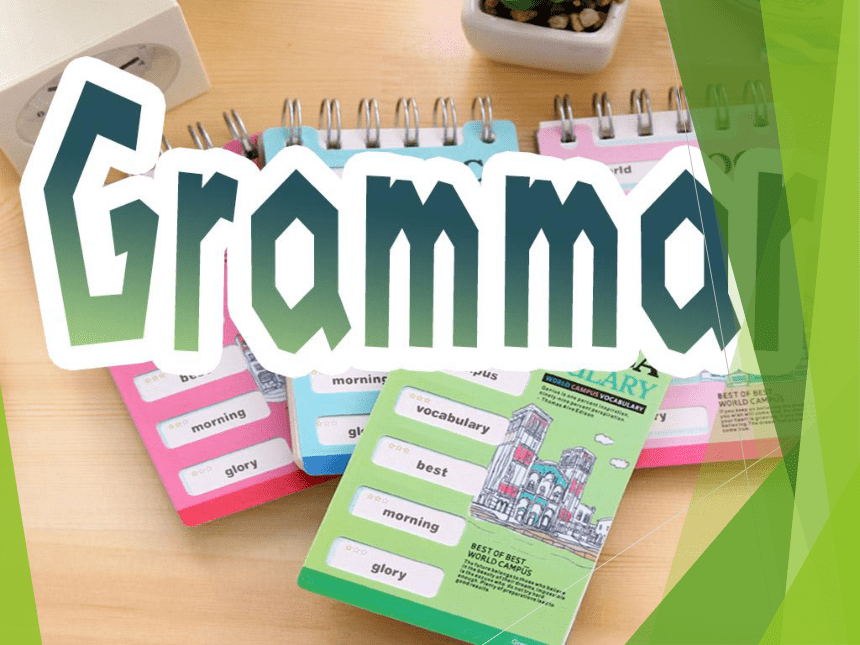

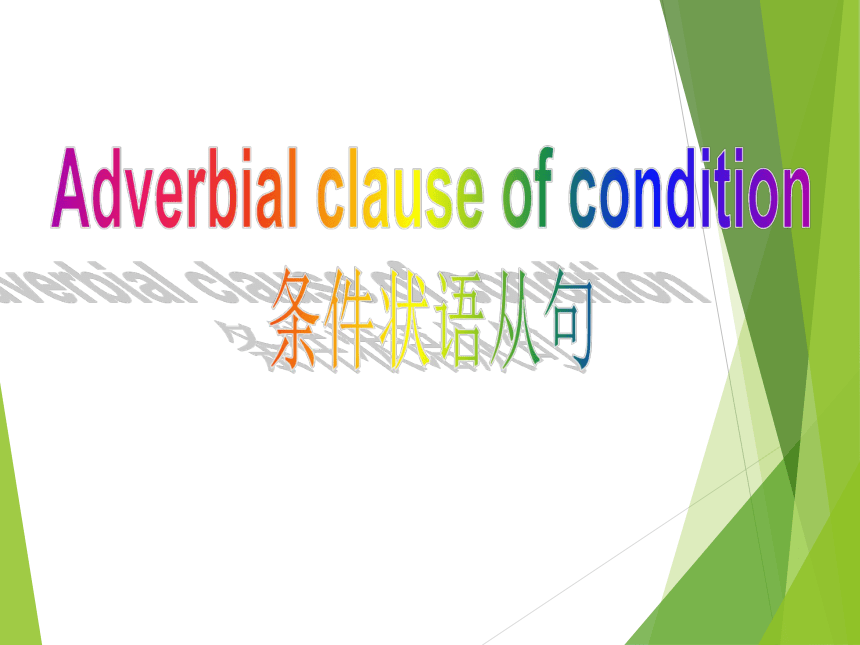
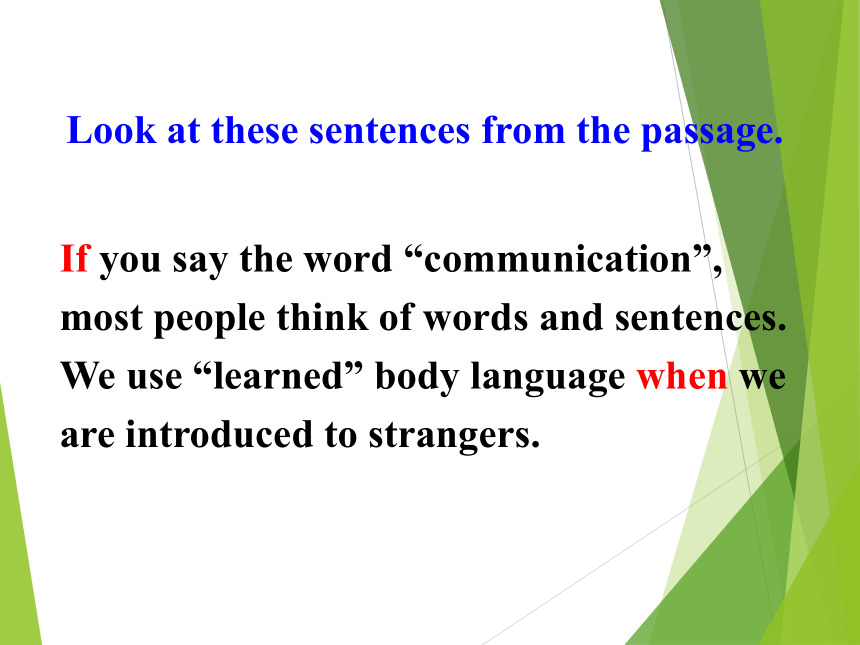
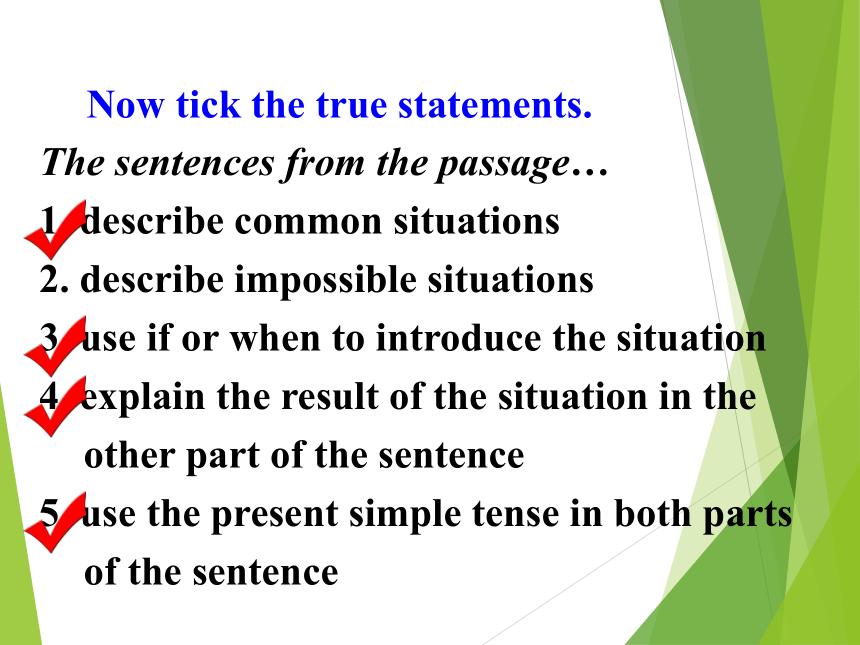
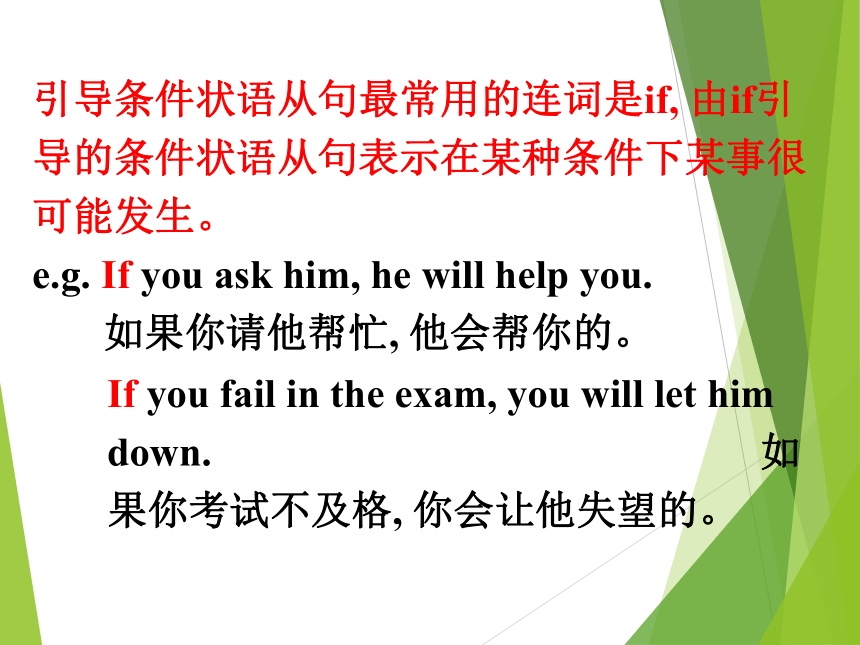
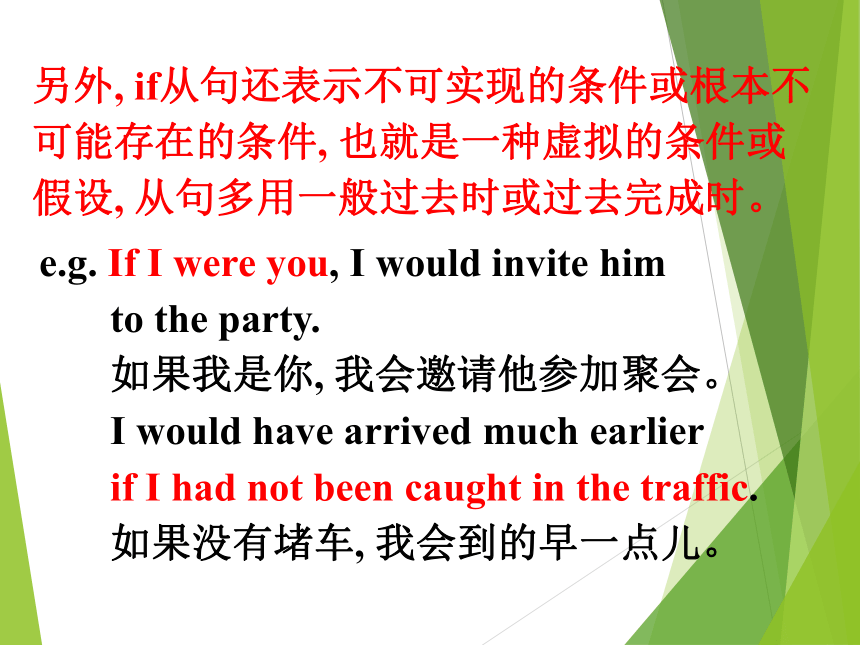
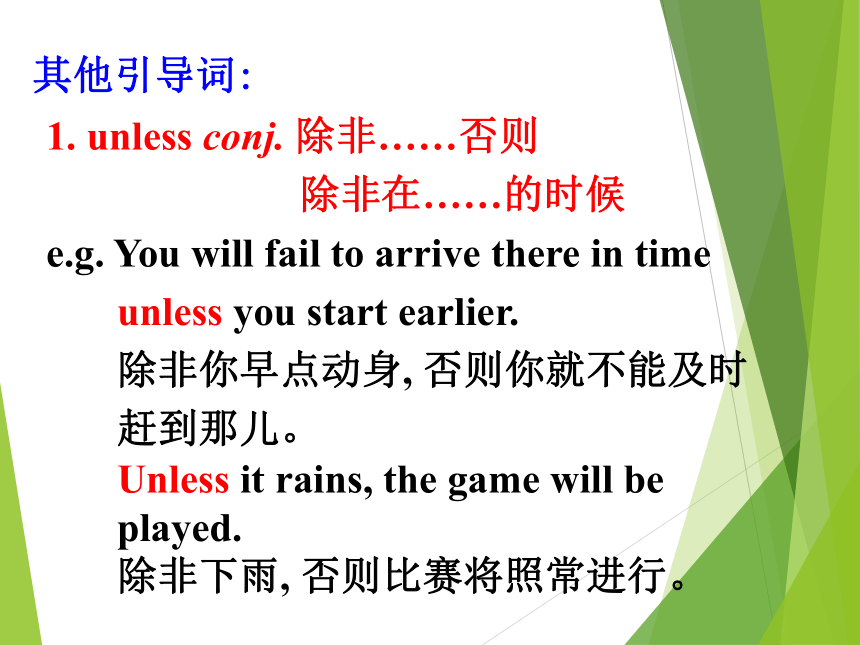
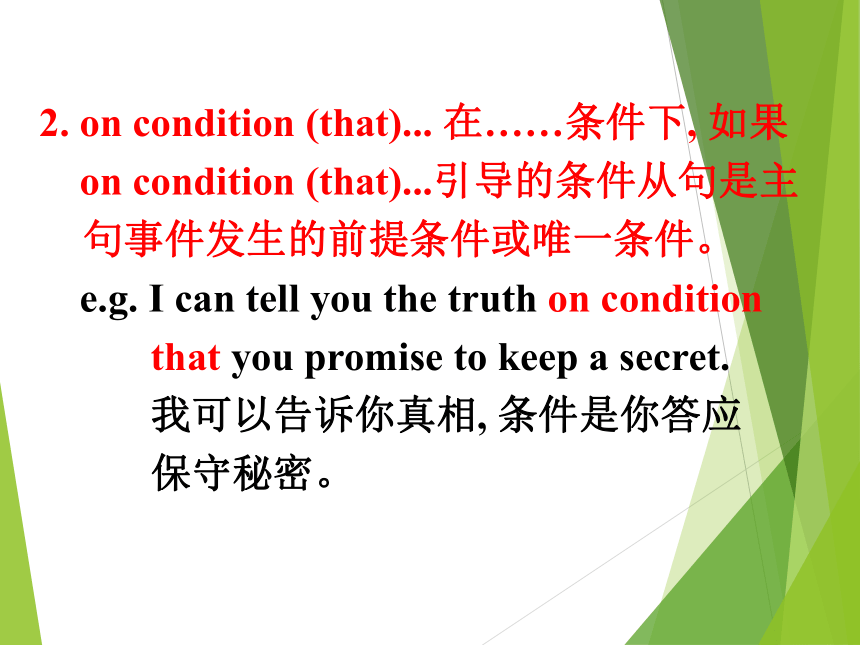
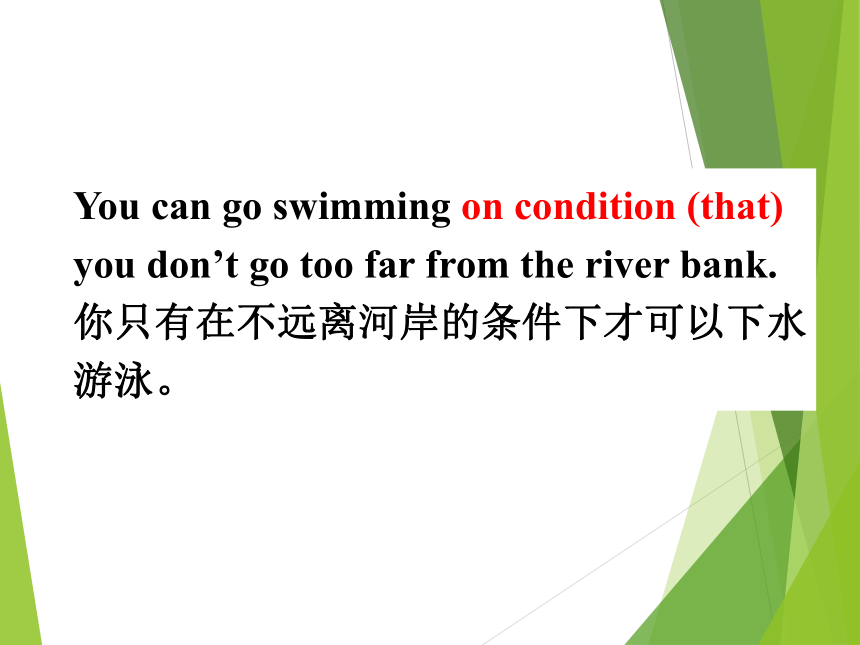
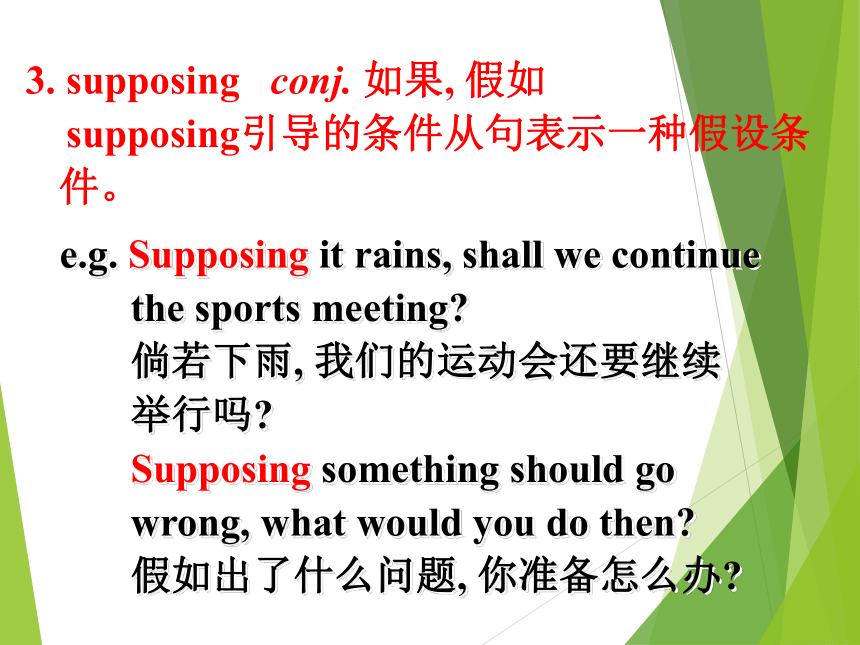
文档简介
课件57张PPT。Module 3 Body Language
and Non-verbal CommunicationTo learn the use of adverbial clause of condition.
To learn the use of adverbial clause of concession.Adverbial clause of condition
条件状语从句If you say the word “communication”, most people think of words and sentences.
We use “learned” body language when we are introduced to strangers. Look at these sentences from the passage.The sentences from the passage…
1. describe common situations
2. describe impossible situations
3. use if or when to introduce the situation
4. explain the result of the situation in the other part of the sentence
5. use the present simple tense in both parts of the sentenceNow tick the true statements.引导条件状语从句最常用的连词是if, 由if引导的条件状语从句表示在某种条件下某事很可能发生。
e.g. If you ask him, he will help you.
如果你请他帮忙, 他会帮你的。If you fail in the exam, you will let him down. 如果你考试不及格, 你会让他失望的。e.g. If I were you, I would invite him
to the party.
如果我是你, 我会邀请他参加聚会。
I would have arrived much earlier
if I had not been caught in the traffic.
如果没有堵车, 我会到的早一点儿。另外, if从句还表示不可实现的条件或根本不可能存在的条件, 也就是一种虚拟的条件或假设, 从句多用一般过去时或过去完成时。其他引导词:1. unless conj. 除非……否则
除非在……的时候
e.g. You will fail to arrive there in time
unless you start earlier.
除非你早点动身, 否则你就不能及时
赶到那儿。
Unless it rains, the game will be
played.
除非下雨, 否则比赛将照常进行。 2. on condition (that)... 在……条件下, 如果
on condition (that)...引导的条件从句是主句事件发生的前提条件或唯一条件。
e.g. I can tell you the truth on condition
that you promise to keep a secret.
我可以告诉你真相, 条件是你答应
保守秘密。You can go swimming on condition (that) you don’t go too far from the river bank.
你只有在不远离河岸的条件下才可以下水游泳。e.g. Supposing it rains, shall we continue
the sports meeting?
倘若下雨, 我们的运动会还要继续
举行吗?
Supposing something should go
wrong, what would you do then?
假如出了什么问题, 你准备怎么办?3. supposing conj. 如果, 假如
supposing引导的条件从句表示一种假设条件。4. provided conj. 假如, 除非,
以……为条件
provided (that) + 从句, 表示一种假设
条件。
e.g. He will sign the contract provided
we offer more favorable terms.
如果我们提出更优惠的条件, 他就
会在合同上签字。He won’t be against us in the meeting
provided that we ask for his advice in
advance.
如果我们提前征求一下他的意见, 他就不会在会上反对我们。另外还有in case, as/so long as等。
e.g. In case it rains, do not expect me.
如若下雨, 就不要等我了。
As long as you promise to come,
I’ll wait for you until you come.
只要你答应, 我就等你来。从上述例句可以看出if, unless, on condition (that), supposing, provided等词引导的条件状语从句, 主从句条件关系分明, 结构清晰。
在条件状语从句中, 用一般现在时代替一般将来时, 一般过去时代替过去将来时。 但有些句子, 虽没有含条件关系的连词,却也隐含着条件关系, 这些句子常用一些词, 如but for, without等引出一个介词结构来表示条件, 条件常常是虚拟的,或与事实相反的假设。but for 若非, 要不是e.g. But for the rain, we should have a
pleasant journey.
要不是下雨, 我们的旅行肯定会很愉
快的。
But for your help, we should not
have finished in time.
要不是你帮忙, 我们肯定不能及时完
成任务。Find more examples of sentences with if or when in the passage. 1) If our right hand is busy greeting someone, it cannot be holding a weapon.
2) If you shake hands with someone, you show you trust them.3) We shake hands when we make a deal.
4) When we greet someone, we put the right hand over the left and bow slightly. 1.?If you ____ a cake your host ______ very pleased. (take, be)
2.?Unless the weather ____ better, I _______ at home. (get, stay)
3.?He _______ home early if he __________ well. (go, not feel)take will be gets will stay will godoesn’t feelComplete the sentences with the
correct form of the verbs in brackets.4.?What _____ I ___ if they ____ about politics? (do, talk)
5.?If you _____ your hand, the taxi _________. (raise, stop)
6. I __________ anything unless he ____ me. (not say, ask)raise will stop will not say asksshalldotalk1. —Are you thinking about going to New
York for the holiday? —No. But if I ________ the time, I
would definitely go. A. have???? B. had??
?C. have had????? D. would have Choose the best answers.2. If you _______ this experiment, you will understand the theory better. A. will be doing??????? B. have done?????
C. will have done???? ?D. would do 3. The volleyball match will be put off if
it ________. A. will rain?????????? B. rains??????
C. rained????????????? D. is raining 4 . — Shall Brown come and play
computer games? — No, ________ he has finished his
homework. A. when???????B. if???????C. unless???D. onceAdverbial clause of concession
让步状语从句 1. Whatever you do, don’t leave immediately after the meal is finished.
a.?It is important to leave immediately
after the meal has finished.
b.?Don’t do anything after the meal
has finished.
c.?You can do anything you like after
the meal has finished.
d.?It is important not to leave
immediately after the meal has finished.Read the sentences and choose the correct meaning.2. However hungry you are, you shouldn’t
start to eat before your host does.
a.?If you are hungry you can start to eat.
b.?Even if you are hungry you should wait.
c.?It is important to start eating before your host.
d.?Don’t eat anything if you’re not hungry.1. though, although虽然, 纵然。在一般情况下可以互换使用。
在口语中, though较常使用, although比though正式, 二者都可与yet, still或nevertheless连用, 但不能与but连用。 让步状语从句的引导词:e.g. Though/Although he was worn out, (still) he kept on working.
虽然他已经精疲力竭, 但仍然继续工作。
Though/Although he is very old, (yet) he is quite strong.
他虽然年纪大了, 身体还很健壮。
注意: although引导的让步状语从句位于主句之前的情况较多, though引导的让步状语从句可位于主句之前或主句之后。
e.g. She passed the examination though
she had not studied very hard.
她虽然不用功学习, 考试却及格了。2. Object as you may, I’ll go. = Though /
Although you may object, I’ll go.
纵使你反对, 我也要去。
Hard as/ though he works, he makes
little progress.= Though he works
hard, he makes little progress.
尽管他学习很努力, 但几乎没取得什
么进步。 【归纳】
as, though虽然……但是, 纵使……。
as引导的让步状语从句必须以________
的形式出现, 被倒装的部分可以是表语、状语或动词原形, though间或也用于这样的结构中, 但although不可以这样用。部分倒装Child as / though he was, he knew what was the right thing to do. =Though he was a child, he knew what was the right thing to do.
虽然他是一个孩子, 但他知道该做什么。Fast as you read, you can’t finish the book so soon.
纵然你读得快, 你也不能这么快读完这本
书。 3. even if, even though 即使……, 纵使……”。这两个复合连词的意思基本相同,它们常可互换使用, 但意义有细微差别。
even if引导的让步从句含有强烈的假定性, 而even though引导让步状语从句时, 是以从句内容为先决条件的, 也就是说, 说话人肯定了从句的事实。 e.g. We’ll make a trip even if/though the
weather is bad.
即使天气不好, 我们也要作一次旅行。
Even if he is poor, she loves him.
= He may be poor, yet she loves him.
即使他很穷, 但她还是爱他。Even though he is poor, she loves him.
= He is poor, yet she loves him.
尽管他很穷, 但她还是爱她。4. whether ... or ...不论是否……, 不管是……还是……。
由这一个复合连词引导的让步状语从句旨在说明正反两个方面的可能性都不会影响主句的意向或结果。e.g. You’ll have to attend the ceremony
whether you’re free or busy.
不管你忙不忙, 都要参加这个典礼。
Whether you believe it or not, it’s
true.
无论你是否相信, 这都是真的。“no matter + 疑问词”或“疑问词-ever” “……都……; 不管……都……”, 引导的让步状语从句可以互换。
e.g. No matter what happened, he
would not mind.
= Whatever happened, he would
not mind.
无论发生了什么, 他都不会介意的。 No matter who you are, you must keep the law.
=Whoever you are, you must keep the law.
不管你是谁, 你都要遵纪守法。“no matter + 疑问词”结构只能引导让步状语从句, 而“疑问词-ever”还可以引导名词性从句。
e.g. Whatever (= No matter what) you
say, I won’t believe you. (Whatever
引导让步状语从句)
无论你说什么, 我都不会相信你。I’ll eat whatever (≠ no matter what) you give me. (whatever引导宾语从句)
你给我吃什么, 我就吃什么。
Whoever comes will be welcome. (Whoever引导主语从句)
不管谁来都受到欢迎。有时while也可以引导让步状语从句, 但一般要位于句首。
e.g. While I like the colour, I don’t like
the shape.
我虽然喜欢那颜色, 但不喜欢那形
状。 1. _______?birds?use?their?feathers?for?
flight,?some?of?their?feathers?are?for?
other?purposes.?
A.?Once???? B.?If????
C.?Although??? D.?Because 2. My?grandfather?still?plays?tennis?now?
and?then,?_______?he’s?in?his?nineties.?
A.?as?long?as?????? B.?as?if?????
C.?even?though???? D.?in?case1.?_________ I feel lonely, I think about you.
2. ________ he is, he is very rude to me.
3. _________ I go, I always meet interesting people.
4.?You can invite _______ you like to the party. WheneverWhoeverWhereverwhoever Complete the sentences with whoever, wherever, whenever or however. 5. ________ late you arrive, I’ll come and meet.
6. I feel shy ________ she says hello to me.
7.?I hear that song _________ I switch on the radio.
8. ________ much I study, I find these exercises difficult. However whenever whenever However 选用方框内合适的关联词并用其正确形式完成下面短文(可重复选用)。
Dear kids,
Don’t be frightened, the world isn’t coming to an end. I am simply taking a bath.however, if, whatever, even though, unless Don’t panic 1. _____ I’m not out right on time. Do not knock on the door to hear my voice. I promise that 2. ____________ you can’t see me, I am on the other side. I’m not digging an escape tunnel (地道) and running away. 3. ________ I said a while ago, I didn’t mean it.however, if, whatever, even though, unlessWhateverifeven though?? 4. ________ much I would like it, water does not make me forgetful. I remember who you are. 5. ____ you want to use our other bathroom but someone is in it, you will just have to wait. 6. _______ you have four feet and a tail, do not think of going outside to “water” the lawn (草坪). however, if, whatever, even though, unlessUnlessHowever?If 7. ________ the house catches on fire, stay inside and keep the doors locked.
Be good. Entertain yourselves. Yes, you can do both at the same time. I’ll be out soon.
Love,
Your mom? however, if, whatever, even though, unlessUnlessI.?选用括号内合适的内容完成下面句子。
1. You’ll still miss your train ________ (even if / as long as) you take a taxi.??
2. Try ________ (although / as) she might, Sue couldn’t get the door open.?
3. Don’t leave the building ________ (unless / though) you are instructed to do so.?
4.? ________? (When / While) I accept that he’s not perfect in many respects, I do quite like him.even ifasunlessWhile5. They agreed to lend us the car ______________ (on condition that / as soon as) we returned it before the weekend.?
6. Small sailboats can easily turn over in the water ___________ (if / unless) they are not managed carefully.?on condition thatifII.?根据括号内的提示翻译下面句子。
1.?他能和我们一起来,只要他自己付饭钱。?(provided that)
2.?你最好带上钥匙,以免我不在。?(in case)
3.?无论她走到哪儿,都有很多人等着看她。?(wherever)He can come with us, provided that he pays for his own meals.
You’d better take the keys in case I’m out.
Wherever she goes, there are many people waiting to see her.4.?尽管他是个孩子,他却知道应该做什么。(as)
5.?不论我们是否帮助他,他都不会成功。?(whether ... or ...)Child as he was, he knew what was the right thing to do.
Whether we help him or not, he will fail.1. Remember the rules.
2. Finish the exercises 1, 2, 3, 4 on page 79 and 80.
and Non-verbal CommunicationTo learn the use of adverbial clause of condition.
To learn the use of adverbial clause of concession.Adverbial clause of condition
条件状语从句If you say the word “communication”, most people think of words and sentences.
We use “learned” body language when we are introduced to strangers. Look at these sentences from the passage.The sentences from the passage…
1. describe common situations
2. describe impossible situations
3. use if or when to introduce the situation
4. explain the result of the situation in the other part of the sentence
5. use the present simple tense in both parts of the sentenceNow tick the true statements.引导条件状语从句最常用的连词是if, 由if引导的条件状语从句表示在某种条件下某事很可能发生。
e.g. If you ask him, he will help you.
如果你请他帮忙, 他会帮你的。If you fail in the exam, you will let him down. 如果你考试不及格, 你会让他失望的。e.g. If I were you, I would invite him
to the party.
如果我是你, 我会邀请他参加聚会。
I would have arrived much earlier
if I had not been caught in the traffic.
如果没有堵车, 我会到的早一点儿。另外, if从句还表示不可实现的条件或根本不可能存在的条件, 也就是一种虚拟的条件或假设, 从句多用一般过去时或过去完成时。其他引导词:1. unless conj. 除非……否则
除非在……的时候
e.g. You will fail to arrive there in time
unless you start earlier.
除非你早点动身, 否则你就不能及时
赶到那儿。
Unless it rains, the game will be
played.
除非下雨, 否则比赛将照常进行。 2. on condition (that)... 在……条件下, 如果
on condition (that)...引导的条件从句是主句事件发生的前提条件或唯一条件。
e.g. I can tell you the truth on condition
that you promise to keep a secret.
我可以告诉你真相, 条件是你答应
保守秘密。You can go swimming on condition (that) you don’t go too far from the river bank.
你只有在不远离河岸的条件下才可以下水游泳。e.g. Supposing it rains, shall we continue
the sports meeting?
倘若下雨, 我们的运动会还要继续
举行吗?
Supposing something should go
wrong, what would you do then?
假如出了什么问题, 你准备怎么办?3. supposing conj. 如果, 假如
supposing引导的条件从句表示一种假设条件。4. provided conj. 假如, 除非,
以……为条件
provided (that) + 从句, 表示一种假设
条件。
e.g. He will sign the contract provided
we offer more favorable terms.
如果我们提出更优惠的条件, 他就
会在合同上签字。He won’t be against us in the meeting
provided that we ask for his advice in
advance.
如果我们提前征求一下他的意见, 他就不会在会上反对我们。另外还有in case, as/so long as等。
e.g. In case it rains, do not expect me.
如若下雨, 就不要等我了。
As long as you promise to come,
I’ll wait for you until you come.
只要你答应, 我就等你来。从上述例句可以看出if, unless, on condition (that), supposing, provided等词引导的条件状语从句, 主从句条件关系分明, 结构清晰。
在条件状语从句中, 用一般现在时代替一般将来时, 一般过去时代替过去将来时。 但有些句子, 虽没有含条件关系的连词,却也隐含着条件关系, 这些句子常用一些词, 如but for, without等引出一个介词结构来表示条件, 条件常常是虚拟的,或与事实相反的假设。but for 若非, 要不是e.g. But for the rain, we should have a
pleasant journey.
要不是下雨, 我们的旅行肯定会很愉
快的。
But for your help, we should not
have finished in time.
要不是你帮忙, 我们肯定不能及时完
成任务。Find more examples of sentences with if or when in the passage. 1) If our right hand is busy greeting someone, it cannot be holding a weapon.
2) If you shake hands with someone, you show you trust them.3) We shake hands when we make a deal.
4) When we greet someone, we put the right hand over the left and bow slightly. 1.?If you ____ a cake your host ______ very pleased. (take, be)
2.?Unless the weather ____ better, I _______ at home. (get, stay)
3.?He _______ home early if he __________ well. (go, not feel)take will be gets will stay will godoesn’t feelComplete the sentences with the
correct form of the verbs in brackets.4.?What _____ I ___ if they ____ about politics? (do, talk)
5.?If you _____ your hand, the taxi _________. (raise, stop)
6. I __________ anything unless he ____ me. (not say, ask)raise will stop will not say asksshalldotalk1. —Are you thinking about going to New
York for the holiday? —No. But if I ________ the time, I
would definitely go. A. have???? B. had??
?C. have had????? D. would have Choose the best answers.2. If you _______ this experiment, you will understand the theory better. A. will be doing??????? B. have done?????
C. will have done???? ?D. would do 3. The volleyball match will be put off if
it ________. A. will rain?????????? B. rains??????
C. rained????????????? D. is raining 4 . — Shall Brown come and play
computer games? — No, ________ he has finished his
homework. A. when???????B. if???????C. unless???D. onceAdverbial clause of concession
让步状语从句 1. Whatever you do, don’t leave immediately after the meal is finished.
a.?It is important to leave immediately
after the meal has finished.
b.?Don’t do anything after the meal
has finished.
c.?You can do anything you like after
the meal has finished.
d.?It is important not to leave
immediately after the meal has finished.Read the sentences and choose the correct meaning.2. However hungry you are, you shouldn’t
start to eat before your host does.
a.?If you are hungry you can start to eat.
b.?Even if you are hungry you should wait.
c.?It is important to start eating before your host.
d.?Don’t eat anything if you’re not hungry.1. though, although虽然, 纵然。在一般情况下可以互换使用。
在口语中, though较常使用, although比though正式, 二者都可与yet, still或nevertheless连用, 但不能与but连用。 让步状语从句的引导词:e.g. Though/Although he was worn out, (still) he kept on working.
虽然他已经精疲力竭, 但仍然继续工作。
Though/Although he is very old, (yet) he is quite strong.
他虽然年纪大了, 身体还很健壮。
注意: although引导的让步状语从句位于主句之前的情况较多, though引导的让步状语从句可位于主句之前或主句之后。
e.g. She passed the examination though
she had not studied very hard.
她虽然不用功学习, 考试却及格了。2. Object as you may, I’ll go. = Though /
Although you may object, I’ll go.
纵使你反对, 我也要去。
Hard as/ though he works, he makes
little progress.= Though he works
hard, he makes little progress.
尽管他学习很努力, 但几乎没取得什
么进步。 【归纳】
as, though虽然……但是, 纵使……。
as引导的让步状语从句必须以________
的形式出现, 被倒装的部分可以是表语、状语或动词原形, though间或也用于这样的结构中, 但although不可以这样用。部分倒装Child as / though he was, he knew what was the right thing to do. =Though he was a child, he knew what was the right thing to do.
虽然他是一个孩子, 但他知道该做什么。Fast as you read, you can’t finish the book so soon.
纵然你读得快, 你也不能这么快读完这本
书。 3. even if, even though 即使……, 纵使……”。这两个复合连词的意思基本相同,它们常可互换使用, 但意义有细微差别。
even if引导的让步从句含有强烈的假定性, 而even though引导让步状语从句时, 是以从句内容为先决条件的, 也就是说, 说话人肯定了从句的事实。 e.g. We’ll make a trip even if/though the
weather is bad.
即使天气不好, 我们也要作一次旅行。
Even if he is poor, she loves him.
= He may be poor, yet she loves him.
即使他很穷, 但她还是爱他。Even though he is poor, she loves him.
= He is poor, yet she loves him.
尽管他很穷, 但她还是爱她。4. whether ... or ...不论是否……, 不管是……还是……。
由这一个复合连词引导的让步状语从句旨在说明正反两个方面的可能性都不会影响主句的意向或结果。e.g. You’ll have to attend the ceremony
whether you’re free or busy.
不管你忙不忙, 都要参加这个典礼。
Whether you believe it or not, it’s
true.
无论你是否相信, 这都是真的。“no matter + 疑问词”或“疑问词-ever” “……都……; 不管……都……”, 引导的让步状语从句可以互换。
e.g. No matter what happened, he
would not mind.
= Whatever happened, he would
not mind.
无论发生了什么, 他都不会介意的。 No matter who you are, you must keep the law.
=Whoever you are, you must keep the law.
不管你是谁, 你都要遵纪守法。“no matter + 疑问词”结构只能引导让步状语从句, 而“疑问词-ever”还可以引导名词性从句。
e.g. Whatever (= No matter what) you
say, I won’t believe you. (Whatever
引导让步状语从句)
无论你说什么, 我都不会相信你。I’ll eat whatever (≠ no matter what) you give me. (whatever引导宾语从句)
你给我吃什么, 我就吃什么。
Whoever comes will be welcome. (Whoever引导主语从句)
不管谁来都受到欢迎。有时while也可以引导让步状语从句, 但一般要位于句首。
e.g. While I like the colour, I don’t like
the shape.
我虽然喜欢那颜色, 但不喜欢那形
状。 1. _______?birds?use?their?feathers?for?
flight,?some?of?their?feathers?are?for?
other?purposes.?
A.?Once???? B.?If????
C.?Although??? D.?Because 2. My?grandfather?still?plays?tennis?now?
and?then,?_______?he’s?in?his?nineties.?
A.?as?long?as?????? B.?as?if?????
C.?even?though???? D.?in?case1.?_________ I feel lonely, I think about you.
2. ________ he is, he is very rude to me.
3. _________ I go, I always meet interesting people.
4.?You can invite _______ you like to the party. WheneverWhoeverWhereverwhoever Complete the sentences with whoever, wherever, whenever or however. 5. ________ late you arrive, I’ll come and meet.
6. I feel shy ________ she says hello to me.
7.?I hear that song _________ I switch on the radio.
8. ________ much I study, I find these exercises difficult. However whenever whenever However 选用方框内合适的关联词并用其正确形式完成下面短文(可重复选用)。
Dear kids,
Don’t be frightened, the world isn’t coming to an end. I am simply taking a bath.however, if, whatever, even though, unless Don’t panic 1. _____ I’m not out right on time. Do not knock on the door to hear my voice. I promise that 2. ____________ you can’t see me, I am on the other side. I’m not digging an escape tunnel (地道) and running away. 3. ________ I said a while ago, I didn’t mean it.however, if, whatever, even though, unlessWhateverifeven though?? 4. ________ much I would like it, water does not make me forgetful. I remember who you are. 5. ____ you want to use our other bathroom but someone is in it, you will just have to wait. 6. _______ you have four feet and a tail, do not think of going outside to “water” the lawn (草坪). however, if, whatever, even though, unlessUnlessHowever?If 7. ________ the house catches on fire, stay inside and keep the doors locked.
Be good. Entertain yourselves. Yes, you can do both at the same time. I’ll be out soon.
Love,
Your mom? however, if, whatever, even though, unlessUnlessI.?选用括号内合适的内容完成下面句子。
1. You’ll still miss your train ________ (even if / as long as) you take a taxi.??
2. Try ________ (although / as) she might, Sue couldn’t get the door open.?
3. Don’t leave the building ________ (unless / though) you are instructed to do so.?
4.? ________? (When / While) I accept that he’s not perfect in many respects, I do quite like him.even ifasunlessWhile5. They agreed to lend us the car ______________ (on condition that / as soon as) we returned it before the weekend.?
6. Small sailboats can easily turn over in the water ___________ (if / unless) they are not managed carefully.?on condition thatifII.?根据括号内的提示翻译下面句子。
1.?他能和我们一起来,只要他自己付饭钱。?(provided that)
2.?你最好带上钥匙,以免我不在。?(in case)
3.?无论她走到哪儿,都有很多人等着看她。?(wherever)He can come with us, provided that he pays for his own meals.
You’d better take the keys in case I’m out.
Wherever she goes, there are many people waiting to see her.4.?尽管他是个孩子,他却知道应该做什么。(as)
5.?不论我们是否帮助他,他都不会成功。?(whether ... or ...)Child as he was, he knew what was the right thing to do.
Whether we help him or not, he will fail.1. Remember the rules.
2. Finish the exercises 1, 2, 3, 4 on page 79 and 80.
